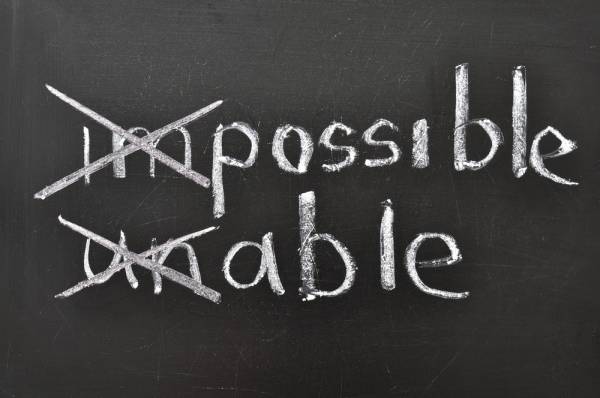Last week we looked at dealing with external noise that can affect our psychological preparation in weightlifting. Now we are going to look at the even more harmful internal noise. Expert Edward Smith calls this noise mental chatter. This type of noise is constant. We are always thinking. And that can be good or bad. We may tell ourselves that we will be successful and cannot be defeated. We may also tell ourselves that we will probably fail or are not good enough. Either way, what we say is something we control, not anyone else. The external noise comes from others, but our internal voice only comes from us.
Far too many of us have critical or negative internal voices. Whole forests have been felled in order to make the paper for umpteen self-esteem books. Where do these thoughts come from?
They come from the myriad of negative messages given to us by parents, other relatives, peers, and the all-powerful media. People are always ready to tell us where we are wrong. We have all seen the articles of how girls especially are fine at age eight but are destroyed by adolescence as they are constantly told they just don’t measure up. As part of this ongoing process you create an internal critic in your mind. Every time you want to do something your little critic is Johnny-on-the-spot to tell you how unrealistic your ambitions are.
Closer to home, many weightlifters eventually end up in our sport after washing out of the mainstream sports. Lifting is seen as a last chance attempt to achieve some sort of athletic glory. They have great visions of succeeding in a high-machismo sport that will finally trump all of their earlier failures at baseball, football, or whatever. Boy, will he show them!
Often nothing of the sort happens. The internal voice has a long and excellent memory. As soon as the easy progress of the novice days comes to a grinding halt, the voice steps front and center. Mental barriers appear, especially at the century marks (100kgs, 200lbs). Competitions are especially vulnerable in this regard. Things go well until the first attempt or maybe the third attempt when the stakes are especially high. Nevertheless, the internal critic can appear in everyday training sessions as well.
This voice can also be discriminating. I knew one lifter who had a thing about his presses (yes, it was long ago). He always made his first attempt and then would miss his next two. Sometimes he would miss the first or second before getting a success. In any case he would only make one-for-three. He would then have a so-so day in the snatch before finally settling down in the clean and jerk. He would make three-for-three there, but since he blew his first two lifts his total was not what it should be. We all know one-lift specialists in the sport, but we may not always be aware of the real reason why.
In any case, you must smother that critical voice in order to succeed in our mind-dominated sport. The first step is acknowledging its existence. Then we must audit everything we hear that voice saying. Whenever we hear any discouraging words we have to stop and tell that voice it is not a valid statement. You must recognize the intent of the message for what it is – something said to defeat yourself. Then you may remember when you first picked up the message, but remember that recognizing its origin does not in itself silence the voice. What has to be done is to simply not repeat the negative message and then replace it with another message, this one positive of course.
 It is important to know that only you give that inner voice any power at all. You have therefore been at least a part-author of your own misery. But it is equally important to know that the opposite process can also work. Instead of thinking about how possible a miss will be on your next lift, you can just as easily think about how you made some easy successes in the past. Relive that day you made several personal records in the same lift.
It is important to know that only you give that inner voice any power at all. You have therefore been at least a part-author of your own misery. But it is equally important to know that the opposite process can also work. Instead of thinking about how possible a miss will be on your next lift, you can just as easily think about how you made some easy successes in the past. Relive that day you made several personal records in the same lift.
I remember my first forays into bigger lifts. I was doing presses, seeing how much I could lift. I took five pound jumps, not knowing how strong I might be. Each success gave me confidence to do the next one. I did not make any misses until I had pressed almost 100lbs over what I ever tried before. It seemed that I could not miss. And that may have been true for that magical afternoon, for I had never missed a lift before in my life. I simply did not know what a failure with a weight felt like. Of course there were other factors at work and I soon hit my limit, but the lesson was learned. Ever since then when the lifts get heavy I think of that day.
This is why as a coach, when we would take a team to a major championship, we discouraged our lifters from watching their teammates before they themselves had to lift in their category. At a World Championships about half of all attempts are failures. That comes with the risk-taking environment inherent in a close competition. While we would require all team members to be present to cheer on whoever was lifting on each day, we did not require it for those still waiting to compete. They would end up watching a lot of misses, some from their own team. This does nothing for the confidence, for the misses seem to stay in the brain longer than the successes. Instead, the athletes would remember their recent PRs and how easy they were (Note: Contrary to intuition most PRs feel easy. It is the misses that feel heavy for multiple reasons.)
 I know of another lifter who always seems to hear that critical voice when it is time to train. This resulted in a lot of missed training sessions. This was rationalized by a whole string of time constraint-related excuses, but the real reason was that he didn’t want to work out that day. The strange part was once he did make it to the gym all he had to do was grip the old York knurling and he would be ready to work out. Something in the feel of that coarse bar silenced his critical voice. But for some reason he could never conjure up the thought of that bar when it was time to leave for the gym. His solution was obvious. Soon he was thinking of that callous maker whenever it was time for him to drive to the gym.
I know of another lifter who always seems to hear that critical voice when it is time to train. This resulted in a lot of missed training sessions. This was rationalized by a whole string of time constraint-related excuses, but the real reason was that he didn’t want to work out that day. The strange part was once he did make it to the gym all he had to do was grip the old York knurling and he would be ready to work out. Something in the feel of that coarse bar silenced his critical voice. But for some reason he could never conjure up the thought of that bar when it was time to leave for the gym. His solution was obvious. Soon he was thinking of that callous maker whenever it was time for him to drive to the gym.
In short, clear your mind first and then drive the negative and critical voices inside your head and replace them with positive ones. These are still only a small part of weightlifting psychology, but they are the important first steps.
What does your little voice tell you and how do you replace the negative thoughts? Please share in the posts below. Next week, in part four, we will discuss how to breathe to control anxiety.
Read the rest of the series:
Psychology in the Weightlifting Arena (Part 1 of a Series)
Psychology in the Weightlifting Arena, Part 2 – Fighting External Noise
Pyschology in the Weightlifting Arena, Part 4 – Getting Centered
Pyschology in the Weightlifting Arena, Part 5 – Charging Up
Pyschology in the Weightlifting Arena, Part 6 – Discharging
Pyschology in the Weightlifting Arena, Part 7 – The Lifter’s Trance
References:
1. Smith, Edward W.L.,Not Just Pumping Iron, Charles C. Thomas Publisher, Springfield, IL, USA, 1989 (ISBN 0-398-05544-0, Library of Congress 88-27569)
Photos courtesy of Shutterstock.






